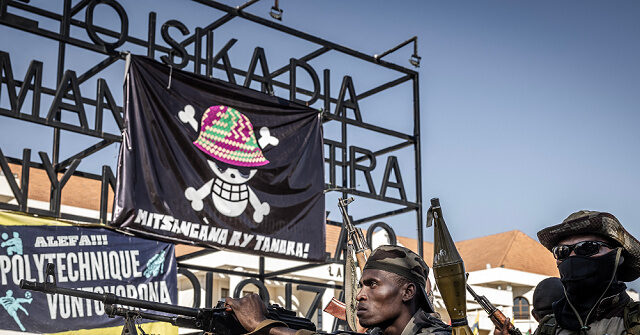Madagascar’s embattled President Andry Rajoelina appeared to reach the end of the line on Tuesday, fleeing the country amid rumors of a coup and unsuccessfully attempting to dissolve Parliament before it could impeach him.
Huge public demonstrations against Rajoelina’s government began in mid-September, prompted by anger over frequent power and water shortages. The people of Madagascar, known as the Malagasy, were also frustrated by rampant government corruption.
The protests became part of the “Gen Z” movement, an uprising across several developing nations by young people who detest their calcified and corrupt governments. Youthful demonstrators in Madagascar took inspiration from protests in Nepal and Indonesia.
Rajoelina tried to suppress the protests with a brutal police crackdown, but that only made the protesters more determined. The tipping point came on Saturday, when an elite military unit known as CAPSAT stepped in to protect the protesters and demand Rajoelina’s resignation.
CAPSAT is both the name of a unit in the Malagasy military, formally known in English as the Personnel and Services Administration Corps, and their camp, which is located near the national capital of Antananarivo. They are not a frontline combat unit, but they are considered an elite division of the military, charged with logistical and technical support.
CAPSAT entered the politics of Madagascar once before, in 2009, when the unit declared control over the entire military command structure and ousted President Marc Ravalomanana. The incident came to be known as the Camp Capsat Mutiny.
Even though CAPSAT is small, the unit is highly influential because of its elite stats and because much of its support work benefits the civilian population. A government official said in 2009 that only 70 to 110 members of CAPSAT were involved in the mutiny that toppled the government.
The Camp Capsat Mutiny installed Rajoelina, formerly mayor of Antananarivo, as the president after Ravalomanana was ousted. He was elected in 2018 and reelected in 2023, although both contests were criticized for election irregularities. Now it appears to be Rajoelina’s turn to be ousted by a CAPSAT coup.
Members of the unit said they stepped in because the police were using harsh tactics against the protesters.
“We in the military are no longer doing our job. We’ve become bootlickers. We chose to submit and carry out orders even when they were illegal instead of protecting the people,” a CAPSAT soldier said on Saturday.
Members of the unit reportedly clashed with police after leaving their camp, but they were able to push through and join protesters outside city hall in Antananarivo by Saturday afternoon, prompting cheers and chants for Rajoelina to resign.
“The Presidency of the Republic wishes to inform the nation and the international community that an attempt to seize power illegally and by force, contrary to the Constitution and to democratic principles, is currently underway,” Rajoelina responded in a statement on Sunday morning.
The presidential office claimed Rajoelina “remained in the country” and “continued to manage national affairs,” but military officials said on Sunday the president had fled the country, and Rajoelina confirmed he had retired to an undisclosed “safe location” on Monday. He claimed he was planning to address the nation on television on Monday afternoon, but changed his plans when “a group of armed forces threatened to take control of the state-owned media.”
As in 2009, CAPSAT said on Sunday, it had assumed full control of the Malagasy military and had instructed all armed forces to refuse orders to fire upon protesters.
“Let us join forces, military, gendarmes and police, and refuse to be paid to shoot our friends, our brothers and our sisters,” CAPSAT told the rest of Madagascar’s security forces in a social media video. “Close the gates, and await our instructions. Do not obey orders from your superiors. Point your weapons at those who order you to fire on your comrades in arms because they will not take care of our families if we die.”
On Tuesday, Rajoelina made a last-ditch effort to remain in power by issuing a decree that would have dissolved the national parliament before it could impeach him.
“I have decided to dissolve the National Assembly, in accordance with the Constitution. This choice is necessary to restore order within our Nation and strengthen democracy. The People must be heard again. Make way for the youth,” he said on social media, attempting to position himself as the voice of the protesters who have been demanding his resignation.
Opposition leaders dismissed Rajoelina’s decree as illegal and began the process of impeaching him. On Tuesday, a colonel in the army of Madagascar appeared outside the presidential palace to announce Rajoelina had been impeached, and the military was now in charge of the national government.
“We have taken the power,” said Col. Michael Randrianirina.
Randrianirina said the upper house of the National Assembly had been dissolved, the constitution had been suspended, and a council of military and police officers would run the government until a prime minister could be appointed to form a civilian administration. He evidently was not referring to Prime Minister Ruphin Fortunat Zafisambo, the former army general appointed as prime minister by Rajoelina last week.
Randrianirina told the BBC on Tuesday that the military had to take control to avoid “total chaos” in the country. He insisted that the military was still firmly under the direction of its legal command structure, including the army chief of staff and the minister of the armed forces.
Read the full article here


